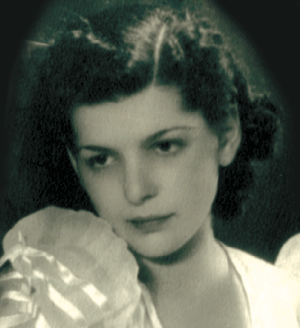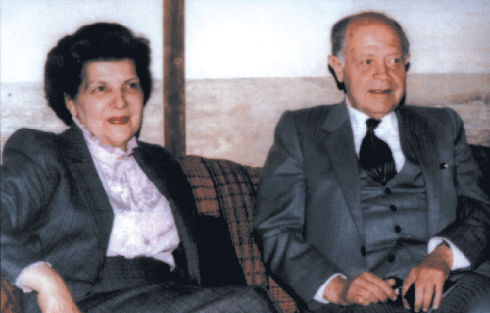“I will make my famous Omlette! Nobody prepares eggs around here while I am at home!”
This wasn’t a traditional housewife fussing at the kitchen. Nor was it a retired husband accustomed to working around the house. These were the words of a very busy man, a giant scholar, a first-class politician, and a seasoned statesman used to the company of kings and presidents. His name was Madani al-Khiyami, and he was speaking to his beautiful wife—and friend—Jamila Mourad, a lady with charm, talent, and character.
It wasn’t a Syrian version of Romeo & Juliet. Nor was it an arranged traditional marriage, as is common in the Arab world. It started with a favorable and mutual first impression, transformed into companionship, love, and respect between the strong minded Jamila and the young medical doctor, Madani.
The young man was a spoiled, favored only child to his mother and father. Coming after ten unsuccessful pregnancies, the Khiyamis finally rejoiced at their firstborn. His mother delivered while en route to the Hajj pilgrimage in Saudi Arabia, and named him Madani after al-Medina al-Munawarah, the second holiest city in Islam.
Madani al-Khiyami studied medicine at the American University of Beirut (AUB) and graduated in 1936. He went to Lyons in France where he studied cardiology and returned to Syria in 1938. For one year, he taught at AUB, and frequently visited his friend, the renowned poet Omar Abu Risheh. At this Beirut residence, Khiyami met Abu Risheh’s sister-in-law, Jamila Mourad. Born in Argentina in 1920, she was six years his junior, and had studied at French schools. She spoke flawless French, Spanish, and some English but had poor Arabic. Khiyami, attracted to her from day one, faced an immediate communication problem. He spoke flawless Arabic, English but only some French.
Thanks to Omar Abu Risheh, a Syrian legend in his own right, the young couple continued seeing each other, and got married in the mid-1940s. The immediate change in her life, besides having to play both mother and wife to her pampered groom, was to leave Beirut and settle with him in Damascus. At her new house, with new surroundings, Jamila stayed with her husband and mother-in-law. This wasn’t temporary lodging—it was a residence that lasted for 19-years. The young doctor began walking the tight rope; pleasing his wife and making her feel comfortable, while answering to all of his cherished mother’s needs and wishes. Despite the obvious difficulties, he managed to strike the right balance, creating a favorable atmosphere at home.
The young couple were blessed with four children; three of whom followed in their father’s footsteps and studied medicine while the fourth, current Syrian Ambassador to Great Britain Sami al-Khiyami, studied engineering. Madani did not force any of his children to go into the medical field, but knew exactly how to discourage them from doing otherwise.
studied medicine while the fourth, current Syrian Ambassador to Great Britain Sami al-Khiyami, studied engineering. Madani did not force any of his children to go into the medical field, but knew exactly how to discourage them from doing otherwise.
One day his son Ali came up and said, “I want to become a pilot!” Madani smiled, “Becoming a flight engineer is good. It’s a nice profession, my son.” Surprised, the young man explained, “Not a flight engineer Father. I want to become a pilot!” The father calmly replied, “So you want to become a plane driver—like a taxi driver? Is that what you want?” He then continued, “One day, a millionaire will buy a private jet and assign you to become his driver. He will ask you from time to time to bring him food from a country and clothes, or other gifts from another. Is that what you are looking for Ali?” “My father did not oblige me to change my mind or to study medicine,” says Ali, many years later. “But his words on that particular day made me—unconsciously—switch to medicine the very next morning.”
While Jamila cared for her household of five, Madani entered public life with a variety of public posts and responsibilities. Whenever taking on a government post, Khiyami would temporarily close down his clinic in Damascus. That in turn would allow him more leisure time to spend with his wife and children. Jamila rejoiced when that happened, since otherwise, she never saw enough of her busy husband. At home, Khiyami had a profound sense of humor, and always made sure to treat his children with affection, which was not very common for an earlier generation of Syrian men, and respect. For her part, Jamila mastered the rules of protocol, having to accompany him on many of his official functions. She was actually the one who introduced him to social activity, often holding parties and receptions for Syrian and international dignitaries, which he had to attend. Women, she would say, have a great duty in life, not only restricted to bearing and raising children. Her passion was reflected on her charity work in Damascus. Jamila became a driving force behind many of the charity organizations in Syria, including the Goutte de Lait, al-Essaf al-Nisayi, and the old-age home, Dar al-Saadeh, in which she was both a founder and Board Member.

Madani was never against his wife’s career, always saying that women were needed in all walks of life since they added a beautiful flavor to everything around them. He did insist, however, that she work for pleasure and not for money, since they were financially comfortable at home and didn’t need a second income. Recalling family life, Ali said, “We never heard loud voices in our home. Rarely did I hear my mother and father arguing, or shouting.”
Madani passed away on February 20, 1997. He was 83. Al-Sit Jamila (as the Damascenes called her, which means Lady Jamila) was 77. She lost a husband, a friend, and companion who had been by her side, hand-in-hand and shoulder-to-shoulder, for fifty years. Life went on for Jamila Mourad. She had an ambition that knew no bounds and stopped at nothing. She now devoted herself completely to her charitable work, mainly Dar al-Saadeh, until her own passing nine years later, in November 2006.
The professor, the doctor, the minister
During the years of the French Mandate (1920-1946) he became involved in day-to-day politics and was allied to Dr. Abdul-Rahman Shahbandar, the leading nationalist of his generation. As a student activist, he was arrested for his anti-French views in the 1930s. He opened a private clinic in Damascus and practiced medicine following Shahbandar’s assassination in 1940. In 1946, he founded a philosophical saloon in Damascus with the public activist Alice Qandalaft. In 1949, he became private physician to General Husni al-Za’im, saving him from two heart attacks during his brief four-months as President of Syria.
In 1951, General Adib al-Shishakli, the military strongman of Syria, offered Madani the post of Minister of Health, but the post was rejected, reportedly in protest to Shishakli’s military regime. In 1958, Syria and Egypt merged to form the United Arab Republic (UAR) and President Gamal Abdul-Nasser offered him the same post, but he refused for the same reasons. In March 1963, the Baath Party came to power and Prime Minister Salah al-Bitar once again offered him the post of Minister of Health, but he turned it down once again.
In 1968, he became Dean of the Medical School and two years later, on August 5, 1971, he became President of Damascus University. He held this post until November 29, 1972. In October 1972, President Hafez al-Assad appointed him Minister of Health in the cabinet of Prime Minister Mahmud al-Ayyubi. He also served as a deputy in the first Parliament under President Assad from February to December 1971. In August 1976, Prime Minister Abdul-Rahman Khlayfawi renewed his post, and in 1978-1980, so did Prime Minister Mohammad Ali al-Halabi. He retired from public office in January 1980 and was assigned as the head of the Highest Council For Medical Arabic Studies, affiliated with the League of Arab States. From 1980-1989, in his last public post, Madani became Head of the Family Planning Association.